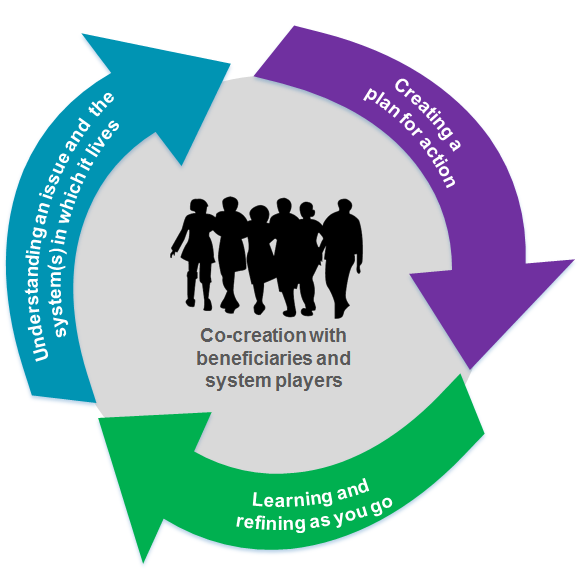Several leading thinkers such as Brenda Zimmerman, Frances Westley, and Michael Quinn Patton (in Getting to Maybe), David Peter Stroh (in Systems Thinking for Social Change), as well as organizations such as Grantmakers for Effective Organizations (GEO), Management Assistance Group, and NPC, have written extensively on the subject of systems thinking as it relates to complex social change.
Peter Senge, The Fifth Discipline
There are a variety of resources available from the Society for Organizational Learning, the Academy for Systemic Change, the Donella Meadows Institute, the Human Systems Dynamics Institute, the Waters Foundation, Management Assistance Group and Grantmakers for Effective Organizations, and others, that outline the core tenets of systems thinking and complexity concepts. Despite the proliferation of resources that describe what systems thinking is, we have found that many social change practitioners (e.g., nonprofit leaders, funders, social impact consultants) remain eager for guidance on how to incorporate systems thinking into their practice.
At FSG, we have been working to identify, codify, and design a framework and a set of tools that can support social change practitioners in improving their awareness and fluency around how to build systems thinking into their work. In our view, this process starts with understanding the key characteristics of complex systems and the implications that those characteristics have for how we work within those systems. To that end, we have called out a few “principles of practice” for working on complex issues, which we have found to be applicable for both strategy and evaluation work.
We also recognize that in order to employ the principles stated above, practitioners need concrete tools. It’s one thing to acknowledge that context and relationships should be paid attention to, yet another thing to put that into practice. Over the next several months, as part of this blog series on systems thinking, we will be sharing many of these tools, accompanied by guidance and reflections based on how we have used them in our work. For an example of one such tool, see our guide to actor mapping.
However, we know that tools by themselves are of little use without a framework that locates them as part of something larger. The systems thinking framework below shows 3 inter-linked phases of any large-scale social change effort through a systems lens:
- Understanding the issue and the system(s) in which it lives, which includes inquiring deeply into how various beneficiaries and stakeholders experience the system
- Creating a plan for action by engaging system players around goals and assumptions, and looking together for points of leverage
- Learning and refining as you go by involving key stakeholders in an adaptive learning and sense-making process to discuss the “so what?” and “now what?” implications of what is being learned

In the next post in this series, we will describe 5 tools to support systems thinking and practice, including visual mapping tools as well as conversational tools. We will provide guidance on where and how the tools best fit within the above framework, as well as which of the principles of practice they help address. Our goal with this blog series is to create greater understanding in the field around systems thinking and tools (particularly their applicability in complex change efforts) leading to enhanced practice. We hope you will join us in this journey.
Read more posts in this series >

